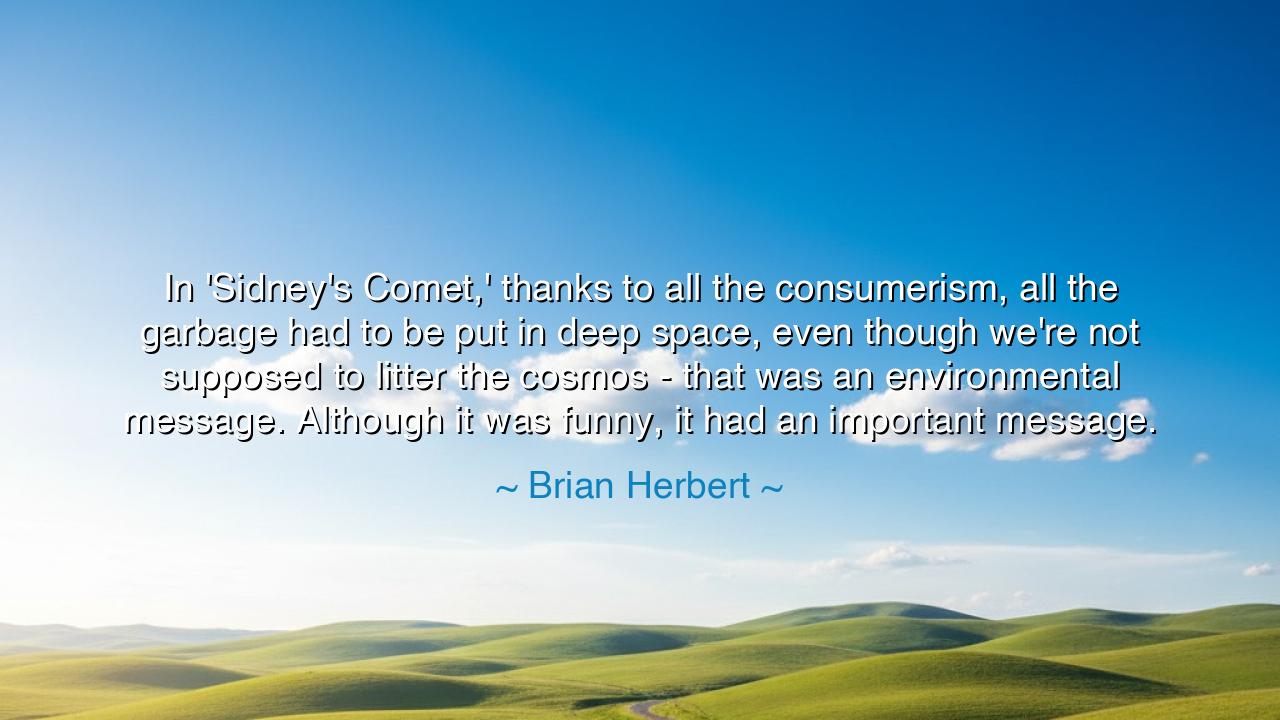
In 'Sidney's Comet,' thanks to all the consumerism, all the
In 'Sidney's Comet,' thanks to all the consumerism, all the garbage had to be put in deep space, even though we're not supposed to litter the cosmos - that was an environmental message. Although it was funny, it had an important message.






Hear the words of Brian Herbert, son of a storyteller and weaver of worlds, who declared: “In Sidney’s Comet, thanks to all the consumerism, all the garbage had to be put in deep space, even though we're not supposed to litter the cosmos — that was an environmental message. Although it was funny, it had an important message.” In this reflection lies a truth clothed in satire: that even laughter can carry a warning, and even comedy can reveal the shadows of our age. For behind the absurdity of sending trash into the heavens lies the mirror of our own folly, a world drowning in what it consumes and discards without thought.
He speaks first of consumerism, the endless hunger for more—more goods, more luxuries, more fleeting pleasures. It is a hunger that does not pause to ask what becomes of the remnants left behind. Mountains of garbage rise on earth, oceans choke with plastic, and skies grow heavy with smoke. Herbert’s tale, though cast as humor, simply lifts this truth into the stars, where humanity, unwilling to face its own waste, casts it off into the cosmos. It is a picture at once absurd and prophetic, for in truth we already launch debris into orbit, leaving the heavens littered with fragments of our ambition.
The garbage hurled into space in his story is not merely physical—it is symbolic. It represents humanity’s refusal to face consequence, the belief that problems may be hidden if only they are sent far enough away. Yet Herbert reminds us, with irony, that even the cosmos should not be defiled, for the universe is no dumping ground for the failures of our stewardship. Just as the ancients would never pour poison into a sacred well, so too should we not scatter refuse among the stars. His message is that no matter how far we cast our waste, it remains a reflection of ourselves, a testament to carelessness.
History itself has borne out warnings like this. In the 20th century, the Cuyahoga River in Ohio caught fire, choked by oil and pollution. The sight was so grotesque that it shocked a nation into action, birthing the Environmental Protection Agency and laws against poisoning waterways. In the same way, Herbert’s cosmic comedy seeks to shock us by exaggeration: what if our rivers, our skies, and finally the heavens themselves became our landfill? His tale reminds us that if folly continues, even the absurd may become reality.
The deeper meaning of his words is that messages can be carried through humor as well as tragedy. For laughter can open ears that would close against scolding. By making us laugh at the image of humanity tossing its garbage into deep space, Herbert lures us into seeing our own world more clearly. The comedy of the tale hides a serious prophecy: that without restraint, humanity will not only destroy its earth but also carry its destruction wherever it goes.
What lesson must future generations take from this? It is that every act of consumption has consequence. Every item purchased, every package discarded, every luxury demanded must eventually be dealt with by the earth. To ignore this truth is to live as a thief against the future, leaving behind not wealth but waste. Stewardship begins with restraint—choosing wisely, reusing faithfully, respecting the limits of the world. For if we cannot govern our appetites, no technology, no frontier, not even the infinite cosmos will be vast enough to contain our refuse.
And to you, listener, I say: heed the wisdom hidden in laughter. Do not dismiss satire as mere jest, for it may hold truths that earnest words cannot carry. Laugh at the absurd image of trash-filled comets, but then ask yourself: how much waste do we cast upon our own earth each day? Change your habits, honor simplicity, and teach your children reverence for the resources they inherit. For if we treat the earth as sacred, it will sustain us; but if we treat it as disposable, it will betray us.
Thus let Brian Herbert’s words endure as a beacon: even the stars must not be littered, and even laughter must carry wisdom. Take the message to heart: consume with care, discard with conscience, and live so that the cosmos itself need not bear witness to humanity’s waste.






AAdministratorAdministrator
Welcome, honored guests. Please leave a comment, we will respond soon